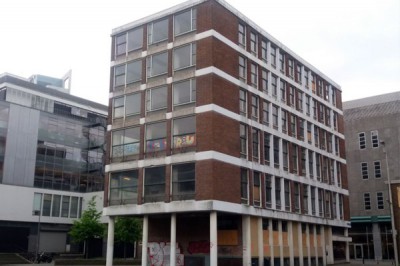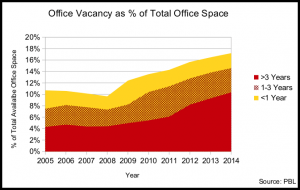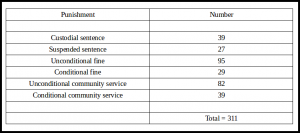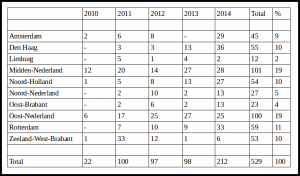The vacancy crunch: The current housing crisis in the Netherlands and the repression of squatting
Recently, an opportunity to discuss the current housing crisis in the Netherlands was wasted. The government published a report evaluating a law realised in October 2010 which both criminalised squatting and suggested a few paltry measures to combat building vacancy (see “From Convicting to Condoning: Evaluation of the Squatting and Vacancy Act” [Dutch]). The report received a few mentions in the media but was accompanied by no real analysis. Whilst the Minister for Safety and Justice writes in a letter to Parliament that “this assessment does not require policy changes,” a careful look at the statistics produced by the report instead indicates that much more could be done (see “Presentation of report evaluating the Squatting and Vacancy Act” [Dutch]). The number of people needing to be housed is increasing, and the best way to solve this problem is to liberate the empty building stock, putting it back into use through both legislative measures and squatting.
Squatting, defined here as making use of empty space without the permission of the owner, has been criminalised in the Netherlands since the Squatting and Vacancy Act of October 2010. Yet this was an action which was already sufficiently regulated: previously, the law mandated that a building could be occupied if it had been empty for one year. It was a simple “use it or lose it” demand: if you went away on holiday for two weeks, your house was safe—indeed your holiday home itself was protected by law if you used it only once in the year—but long term emptiness and neglect could be punished and highlighted through squatting. Thus, squatters housed themselves, made space for many kinds of alternative projects and also performed a societal function in liberating derelict space and putting it back into use. But since the recent law change, squatters can be imprisoned for up to a year (two years if threatening violence or acting in a group) and fined up to 18,500 euros. The regulation of vacancy was provided for by the introduction of the option for municipalities to adopt bylaws. As we shall see, this has been completely ineffective.
Today, there are still many empty buildings and thus squatting continues. Unfortunately, some people have been charged and convicted under the new law, leading to the absurd situation in which, in the time between October 2010 and December 2014, 529 people have been arrested for the act of occupying derelict buildings in 213 reported incidents (where the owner made a complaint to the police). Of these 529 people, 210 have received convictions. It is also worth noting that the courts have found 42 people “not guilty” of squatting. Of course, if we were to include the successful squatting actions in which the police were never notified (or were notified but no official complaint was made), the number would be much higher. Likewise, the numbers of people arrested by the police for squatting and then subsequently released—purely as a means to achieve an eviction—would make that number higher still, but they are not recorded. Finally, squatters arrested for other reasons such as criminal damage or resisting arrest are also not considered in these statistics.
Of those charged and subsequently convicted, 39 people have been imprisoned (not 37 as commonly reported). Thus, a total of 39 people have been put in jail for occupying derelict space. This is outrageous yet strangely has not received much in the way of comment. Though the report obfuscates the numbers and declares that only a “few cases” resulted in imprisonment for longer than a month, the figures are as follows:
Alongside this, 27 people received suspended sentences. Others were fined and yet more received community service, bringing the total figure to 311 as shown in the table below:
The total of 311 being larger than the figure of 210 convictions can be explained by people receiving fines in addition to other penalties. The average fine was 1,000 euros. In terms of where squatting is happening, the table below shows that it is still occurring in all areas of the nation:
Out of a total of 529 arrests, there was a noticeable overall jump from 98 arrests country-wide in 2013 to 212 in 2014. The Minister observes that this is “remarkable” increase, which the authors of the government report say they cannot explain. However, it is common for there to be a lull in activity following the imposition of a changed legal situation and equally common for there to be an upsurge when practitioners realise the chance of punishment is in fact rather low.
Another table in the report indicates that between 2010 and 2014 in Amsterdam, there have only been 12 official complaints made to the police by owners. As the Amsterdam police commissioner himself commented, this is nonsense, since some individual housing corporations have made 12 complaints in a single year. The commissioner, himself no stranger to manipulating information to his own ends (as when fictitious claims were made by the police about booby traps at evictions) stated that the figures left him amazed and complained that the police were not consulted for the report.
Anecdotally, it seems that whilst there are probably less squats now than there were ten years ago, many still exist, with new places being occupied. Squatting continues, even it has become a less attractive option thanks to factors such as the demonization of squatters in the mainstream media, juridical repression, and the rise of other seemingly easier options such as anti-squat (see Dadusc and Dee’s “The criminalization of squatting: Discourses, moral panics and resistances in the Netherlands, England, and Wales,”). However, an email list tracking mainstream media stories about squatting across the Netherlands tends to feature two or three stories every day about occupations and evictions. So while the phenomenon of squatting may have been pushed underground by repression, it is anything but finished.
In fact, to drive home the point that criminalising squatting with the express intention of regulating vacancy was from the beginning a doomed project, the government report itself comments that “the investigation could not confirm that the squatting ban has had effects on the vacancy problem or that the vacancy policy has in a direct sense had any effect on the squatting phenomenon.”
The question which immediately springs to mind is: If the law is not working, why not repeal it?
Cleaning up the mess
The evaluation report states that at the end of 2014, the level of emptiness of office space across the Netherlands is running at 17% (with 10% empty for more than three years). It has been increasing steadily since 2009. Also worth stating is the increasing number of empty shops, which by the close of 2014 was standing at almost 9% of the total amount
The academic Hugo Priemus argues that the solution for the housing crisis is that “empty office space should be converted temporarily or permanently into affordable living space for young people, with rental conditions based on temporary tenancy agreements” (“Squatters in the city: new occupation of vacant offices”). This is the obvious solution, but when he goes on to comment that “temporary tenancy agreements provide a much better legal position for occupants than squatting and anti-squatting” I would disagree, since there seems to be no political will to set up these agreements. What we see instead is an anti-squat , capitalist recommodification of squatting. If squatting was again legally permitted (which will only happen if more people squat), an incentive would arise to introduce more temporary residential deals, and then matters would undoubtedly move faster for the requisition of buildings which could then subsequently be legalised as housing.
Should the state not itself be regulating emptiness? Well, the measures suggested by the 2010 law have had a shockingly low impact. As of January 2016, there are 390 municipalities in the Netherlands. The evaluation report states that only seven municipalities had introduced a vacancy regulation by the end of 2014. It is clear that the municipalities are in general very reluctant to force owners towards action regarding their vacant property. Very little is in practice being done to force vacant property back into use, since dominant attitudes on the primacy of private property rights are so entrenched. In contrast, squatting has been made a criminal offence yet still continues to be a practical and useful means to open up property which has been locked up and left empty through speculation or incompetence. For example, the Wilde Heisteeg was squatted in Amsterdam and then evicted in 2011 under the new law. It then stood empty for 5 years, before being resquatted in 2016. Whilst right-wing politicians bemoaned the squatting action, the Socialist Party representative Erik Flengte gave support, commenting that “it’s idiotic there is a vacancy in a city where the housing shortage is incredibly high.”
Another perspective on the housing crisis is provided by a recent newspaper article in which three housing corporations argue that in Rotterdam there is not enough property in which to house migrants with a right to housing, as the unexpected increase in demand outstrips supply. In 2015, 970 refugees with a right to residence were housed in Rotterdam, out of a total of 1,144. In the first half of 2016 there are predicted to be 906 migrants with a right to housing, with the total across the Netherlands forecast at 23,000 migrants needing to be housed in the second half of 2016. So, clearly a crisis is brewing, yet the previously quoted statistics also make it evident that there is enough property available which could be used. Maria Miller, representative for Woonstad pleads for “unorthodox measures” to be taken. Precisely these methods have been suggested for decades already by squatters repurposing derelict property for housing. The refugee crisis shows that these tactics need to be mainstreamed, since it is not the case that there is nowhere to house migrants, more that there is no political will to do so. Currently refugees are housed in requisitioned buildings and tent camps across the country, in temporary, unpopular fashion.
Future Occupations
We are in a situation in which different voices calling for more stringent regulation of vacancy, yet nothing much is happening. In illustration, the Minister of Security and Justice stated in his letter that, “based on the evaluation, I conclude that municipalities, despite the large amount of vacant offices, are active and successful in every way in fighting vacancy and that the resources provided in the Act are supportive. Therefore, this assessment does not require policy changes regarding the Emptiness Law.” This is ridiculous. There is an urgent need for housing, especially with the increased demand from migrants. Redeploying the huge amount of empty office space is the solution. Thus it seems clear that what is needed to be done is to expropriate unused property and to put it to good use. Of course, regulation would help with this, but the most effective tactic, despite its current illegality, is to squat property.
Of course squatting occurs whether it is declared legal or illegal, and we only have to look around the world to see huge numbers of people living in informal settlements. But my argument here is specifically addressed to the Dutch situation, where juridical measures have repressed squatting with the express aim of preventing vacancy, even though vacancy figures continue to rise exponentially. The statistics demonstrate clearly that the housing shortage situation is getting worse while the amount of empty office space continues to grow.
Dutch squatters have been occupying such spaces quietly and efficiently for generations, housing themselves and others in a manner outside the normal rent relations of neoliberal capitalism. What is staggering is that more people do not squat, instead of entering into bogus deals such as anti-squat in which they sign away all their tenancy rights. It is pathetic that only seven councils have adapted the already very weak proposals in the law regarding the management of emptiness. The growing crisis regarding the housing of migrants with a legal right to residence shows that dramatic solutions are immediately required.





